Master Your Favorite Classical Pieces Without Spending Years On “Classical Training"
Sightread new songs faster, level up your technique and music theory, and effortlessly play
your favorite classical pieces without spending years becoming a classically trained pianist
Take Your Piano Playing To The Next Level
And Play Your Favorite Pieces With Ease
Do you ever feel like the pieces you want to play are always above your skill level?
Do you ever struggle when sightreading new songs…
And wish you had a better understanding of the notes on the page to help you master new pieces faster?
And would you consider yourself a “self taught” piano player – And wish you had a structured approach to improve your playing…
Do you ever feel like the pieces you want to play are always above your skill level?
Do you ever struggle when sightreading new songs…
And wish you had a better understanding of the notes on the page to help you master new pieces faster?
And would you consider yourself a “self taught” piano player – And wish you had a structured approach to improve your playing…

From the studio of Jazer Lee
Melbourne, Australia
Master Your Favorite Classical Pieces Without Spending Years On “Classical Training"
Without Spending Years Becoming
A "Classically Trained" Pianist!
Without Spending Years Becoming A "Classically Trained" Pianist!
After spending the last 14 years as a piano teacher, personally working with thousands of students, plus the feedback I’ve gotten on nearly 40 Million views on YouTube…
I know firsthand how hard it is for self taught piano players to improve their skills in a methodical and efficient manner.

Learn Piano with Jazer Lee
-
UPLOADS
195
-
SUBSCRIBERS
686k
-
VIDEO VIEWS
39,259,176
My students ask me questions like:
- "What piece should I play next that’s not too far above my current level?"
- "How do I know when a piece is done and I’m ready to move on to the next one?"
- "How much time should I spend practicing vs. playing?"
- "Do I really need to learn music theory and sight reading?!"
And sadly, I see way too many students struggling to play their favorite pieces…
Or even worse, giving up altogether because they think “I just don’t have the talent.”
And sadly, I see way too many students struggling to play their favorite pieces, or even worse, giving up altogether because they think “I just don’t have the talent.”
But what you need to realize is...
Here’s What Holds Most Piano Players Back From Reaching The Next Level
When you’re just starting out, learning how to play the piano is all about technique and repetition.
But once you’ve made it to the intermediate level, making progress involves more than just putting in the time and playing the same song again and again until you get it right.
In order to be able to...
- Sit down at the piano and just play – Effortlessly playing your favorite pieces and adding emotion and expression to the music instead of just playing the notes
- Sight-read new songs faster – With a deep understanding of the “why” behind the music to help you master each piece faster and build your classical repertoire
- And have more fun while playing! Knowing exactly what you need to do to continually improve your skills with a gameplan to play ANY piece (No matter how challenging)
You’ll need to…
Stop Choosing Random Pieces To Play Without A Progressive Gameplan For Getting Better
This is the key difference between the self-taught piano player and someone who is classically trained.
The self-taught player doesn’t know how to prioritize practice, playing, learning music theory, sight reading, and most importantly:
Choosing the right piece to play based on your specific level that’s both enjoyable to play AND helps you fill in the gaps in your skillset so you can play even more challenging pieces in the future.
But what do you do if you don’t have thousands of dollars or years of time to spend becoming a classically trained pianist?
Instead, you’ll need to learn…
The 3 Keys To Mastering The Piano And Playing Your Favorite Pieces With Ease
1. Prioritize sight reading
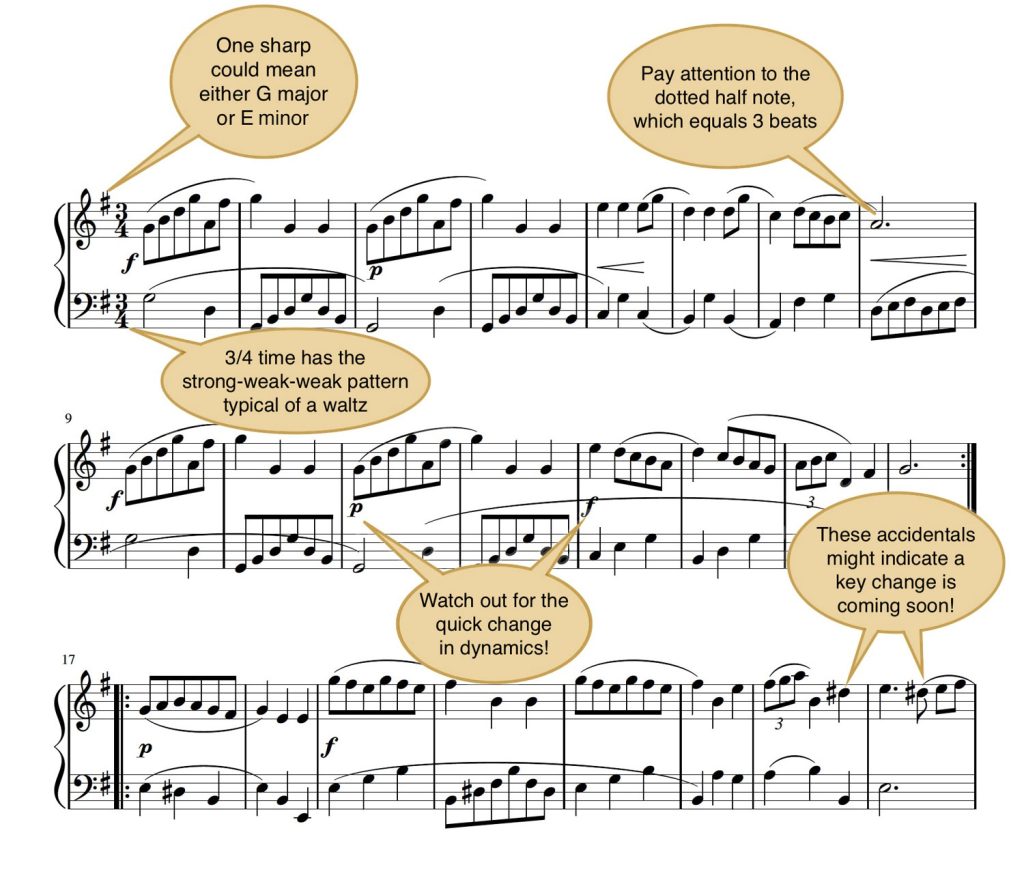
For the longest time, learning new pieces was a struggle for me because I didn’t prioritize sight reading.
The way I used to learn songs was I would just look at the sheet music, memorize it, and then forget about it.
But this really puts a ceiling on how fast you can learn new music.
The big unlock was learning how to quickly recognize chords, time signatures, and the nuts and bolts of sheet music…
So that instead of wasting months just learning the notes to a new song, I was mastering challenging pieces like Chopin Etudes or Clair de Lune in weeks!
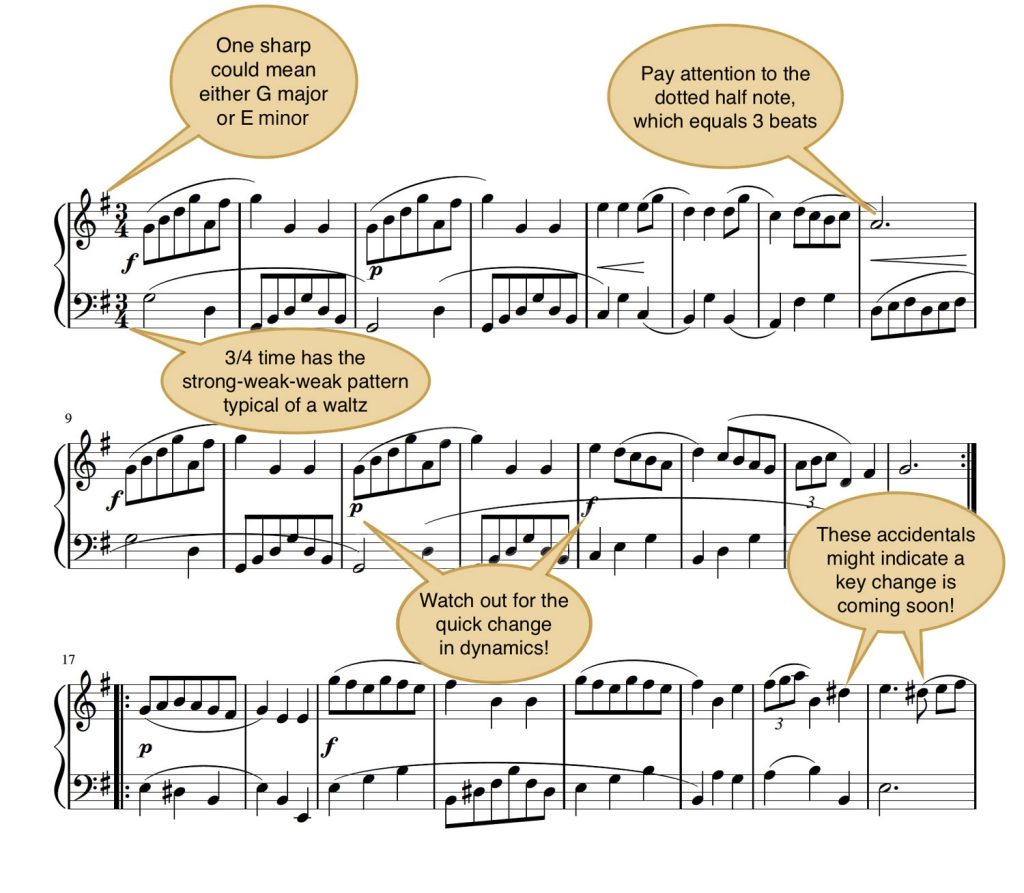
2. Diagnose the “gaps” in your playing
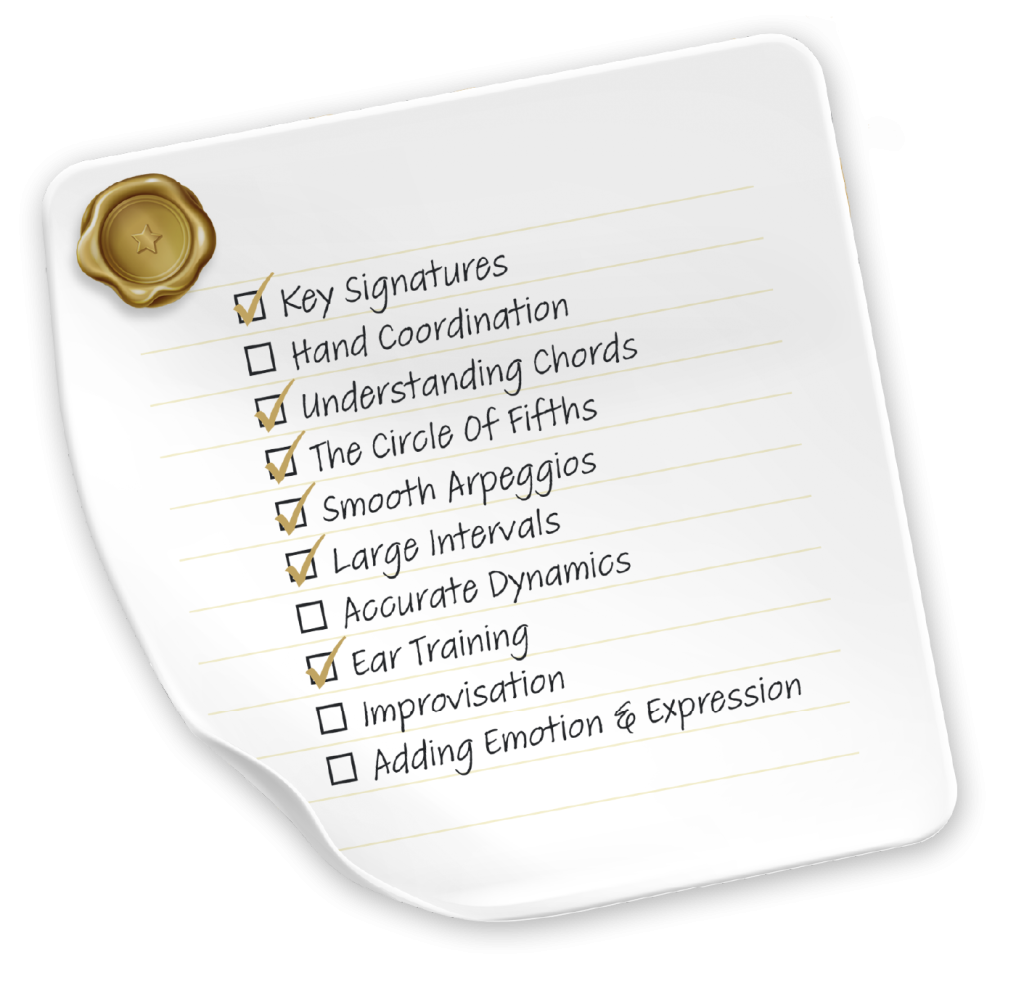
If you want to improve your playing as fast as possible, before jumping into your next piece it’s important to first determine your current skill level.
How fast are you sight reading? How’s your technique and hand coordination? How well do you understand the connection between the chords and the notes on the page?
Then once you get that clarity, you can choose a piece to play that fills in the essential gaps in your playing.
The good news is, no matter what skill level you’re at today, there are dozens of fun, beautiful, challenging pieces you can learn that will both improve your playing faster AND help you build an impressive classical repertoire in the process!
Which leads us to the 3rd and final key...

3. Create a playlist of pieces that progressively improves your skills
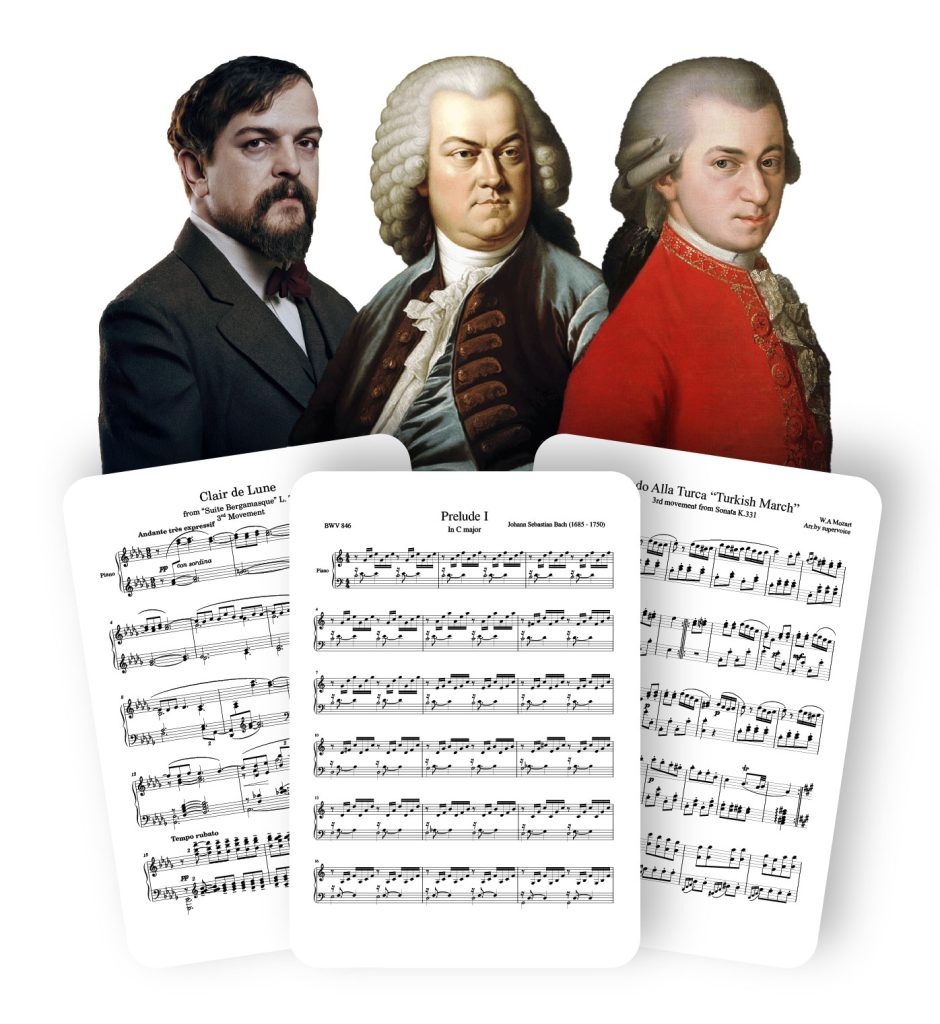
The biggest mistake I see self-taught players make is choosing songs to play at random without a clear gameplan for getting better.
And even though they’re slowly improving with each piece, they’re not able to “connect the dots” between the things they’re learning and applying it to their playing in a practical way.
As a result, many players waste their time practicing exercises that aren’t focused on the specific problems they need to fix…
Or they jump into challenging pieces that are far above their current skill level and waste months trying to grind their way through a song they probably shouldn’t be playing.
But how do you diagnose the gaps in your playing and choose the right piece to play next?

That's why I created...
A Step By Step Roadmap For Mastering The Piano Without Spending Years On Classical Training
A Roadmap For Mastering The Piano Without Spending Years On Classical Training
After seeing so many self taught piano players getting stuck at the same level, as well as countless questions on YouTube asking for help…
I’ve created a comprehensive online course - Distilling down everything I’ve learned over the last 20 years of playing classical piano, plus nearly 14 years teaching it.
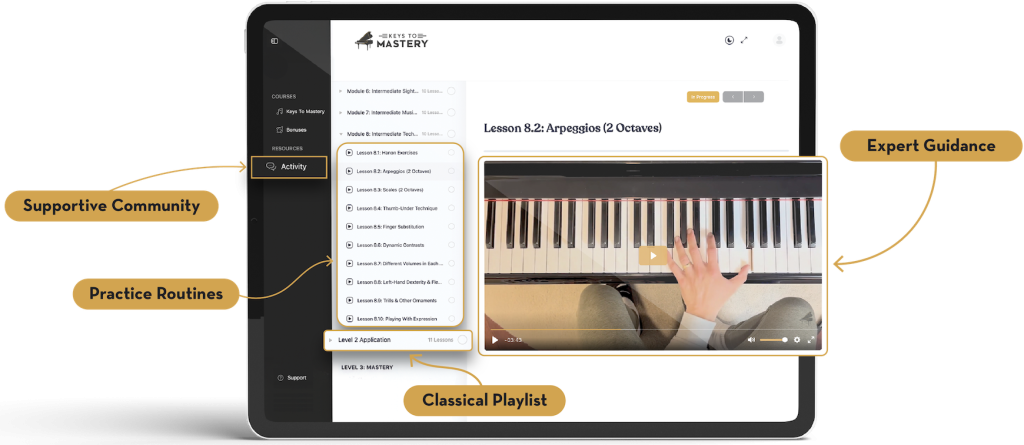
With a clear, efficient roadmap of practice routines, sight reading and music theory lessons, and classical pieces to play that will help you master the 3 essential skills of piano: Technique, sight reading, and music theory
Going through the relevant steps of becoming a classically trained pianist without wasting years at university – With a seasoned piano teacher holding your hand every step of the way.
Build A Repertoire Of Your Favorite Classical Pieces Faster Than You Ever Thought Possible
I hope you’re starting to see how easy it is to improve your playing when you have the right guidance and gameplan.
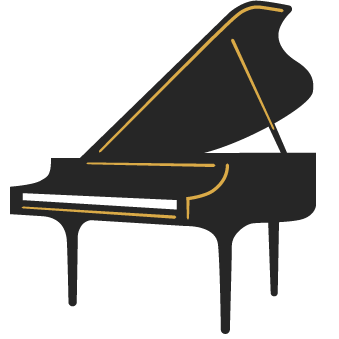
Imagine how much more fun playing the piano will be when you’re quickly unlocking new levels of playing and mastering more and more challenging pieces each week.

Imagine coming home after a long day at work or running errands – And being able to just sit down at the piano, relax in solitude, and effortlessly play your favorite songs.

And imagine building an impressive musical repertoire with dozens of popular pieces – So the next time someone asks “Can you play Chopin, Mozart, or Bach?” The answer is always “Of course!”
- Imagine how much more fun playing the piano will be when you’re quickly unlocking new levels of playing and mastering more and more challenging pieces each week.
- Imagine coming home after a long day at work or running errands – And being able to just sit down at the piano, relax in solitude, and effortlessly play your favorite songs.
- Imagine coming home after a long day at work or running errands – And being able to just sit down at the piano, relax in solitude, and effortlessly play your favorite songs.
Introducing...
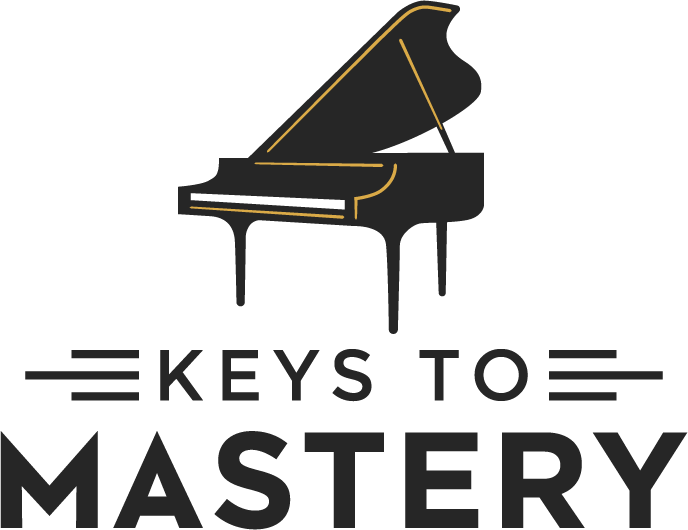
The Most Comprehensive Classical Piano Training Online - Designed To Help You Master The Piano AND Build Your Musical Repertoire Faster Than You Ever Thought Possible
- With 18+ hours of video trainings housed inside a private members area
- Showing you step by step how to rapidly improve your playing...
- While also learning some of the most popular classical pieces in the process!
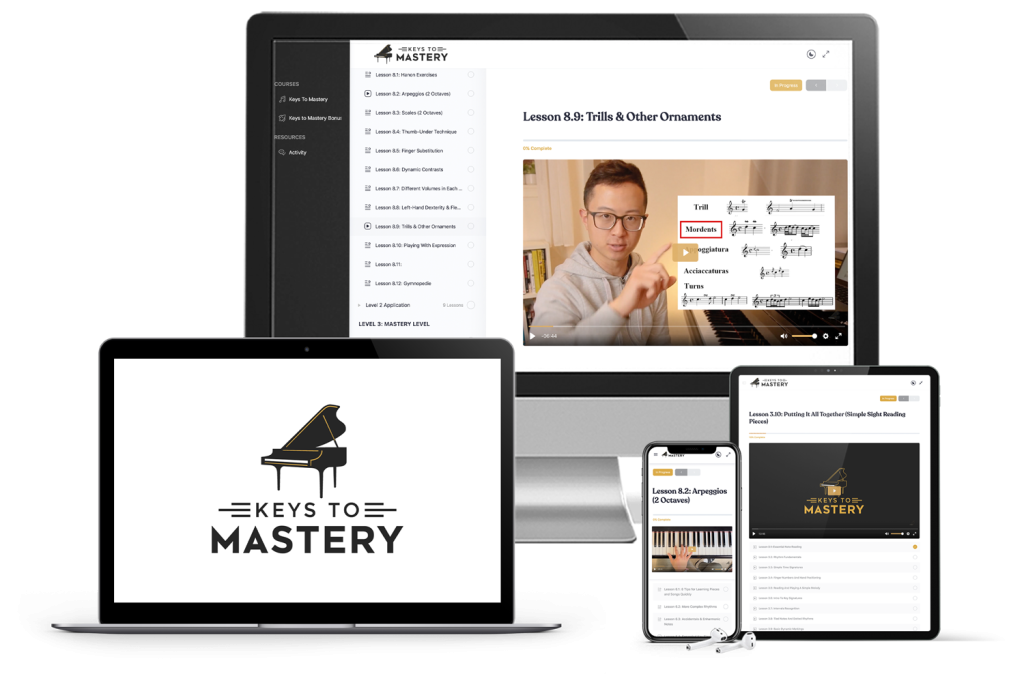
Walking You Step By Step Through Dozens Of Popular Classical Pieces
That’s right! This course isn’t just some data dump of boring practice routines or complicated music theory lessons…
Instead, every step of the way we’ll be learning through playing popular classical pieces like:
- Bach – Prelude in C Major
- Yiruma – River Flows In You
- Beethoven – Moonlight Sonata
- Mozart – Rondo Alla Turca
- Debussy – Clair de Lune
- And so many more!
And distilling it all down into hand coordination and dexterity exercises, sightreading short cuts, and music theory principles that are easy and enjoyable to play.
Then at the end of each level, I’ve also included a comprehensive “Application” section which will show you how to apply the lessons you just learned.
By the end of this course, don’t be surprised if you have 8-10 new classical pieces in your repertoire that you can effortlessly play on the piano…
With an improved confidence, technique, and understanding of music to master ANY new piece you want faster (No matter how challenging!)
So if you’re ready to take your playing to the next level, then click the button below and join Keys to Mastery today!
But Don't Take My Word For It
Check out What Other Students Had To Say About My Courses
Absolutely brilliant!
“Returning to piano after 50 years – a retirement activity – alone I was making little progress. With Jazer, I’ve found a new energy and enthusiasm.
He has provided structure, expectations, and fantastic video instruction – it’s not 1:1, but it feels like it is! He has given me reason to concentrate on scales, Hanon, and theory – all things that I ignored before. Can’t recommend highly enough!”

Phil W
Pleasantly surprised by the great organization and success of this course!
“When i signed up for this course, i just wanted to learn to sight read. I have learned so much more. I love ❤️ the lifetime access to the course and materials, and learning at my own pace.
I enjoy going back through the videos in this course, and i learn something new each time i re-read or watch a course module. My sight reading has drastically improved! Highly recommended Jazer!”

Yvonne M
Wonderfully Comprehensive Classical Piano Course!
“The Keys To Mastery course is the best comprehensive piano instruction course that I have taken online.
Jazer skillfully provides material addressing music theory, technique and applications for each level and is very skilled at presenting the material and I am thoroughly enjoying the course. Deepest thanks Jazer!”

Joe S
A great all-around course!
“I’m an experienced piano player returning after a 15 year hiatus. Through this course I am learning techniques and skills that I never learned in my training, plus invaluable lessons in music theory.
I am only halfway through the course but already my playing has improved. I particularly enjoy the selection of classical pieces at the end of each level. Very happy with my decision to enroll in Keys to Mastery!”

Stefanie A
Here’s How We’ll Level Up Your Playing Together
Module 1
Mindset and Diagnosis
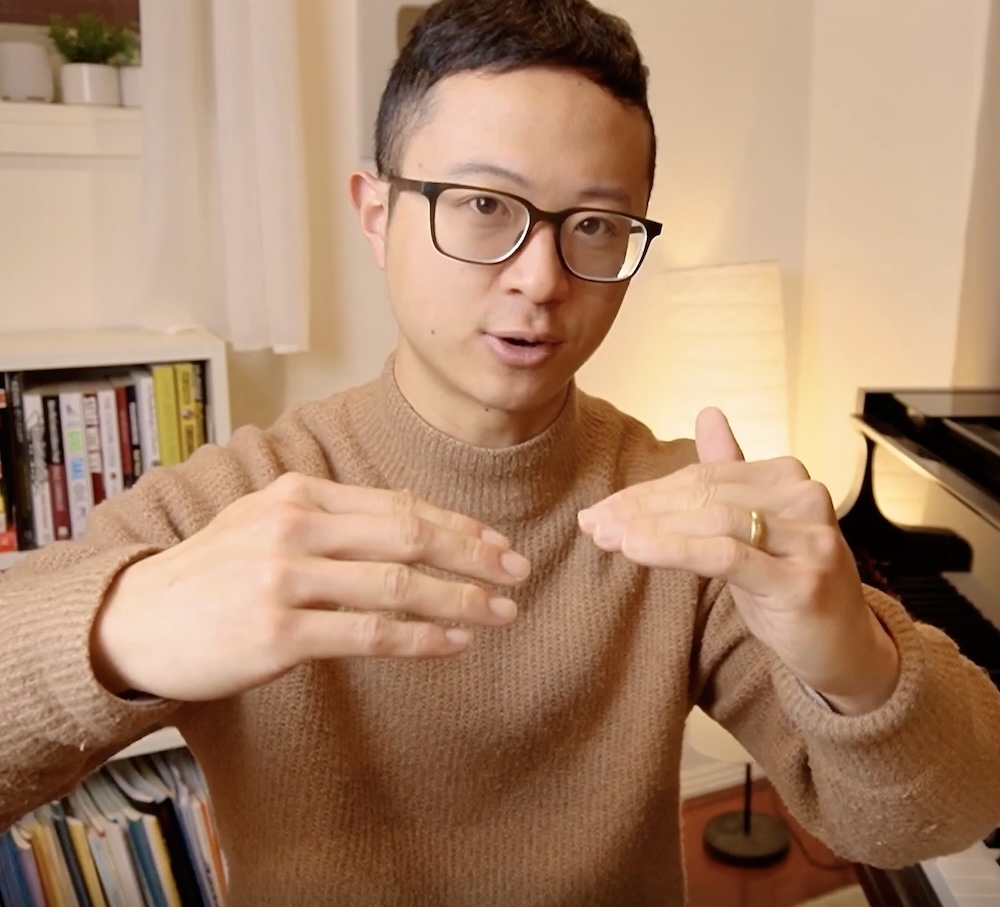
Before we jump into the playing, we need to first make sure you have the right mindset for success.
I’ll also breakdown the 3 “Levels” of playing: Essential, Intermediate, and Mastery
And share the specific techniques, pieces to play, and musical knowledge you’ll need to graduate through each level.
Here’s some of what you’ll learn:
- The Motivation Mindset: It’s not easy staying motivated and engaged when you’re playing the same song for weeks! I’ll show you how to embrace the process so you look forward to every piano session instead of dreading it
- Play Like A Pro: Learn the subtle differences between beginner, intermediate, and advanced piano players – And the practice routines and musical knowledge you’ll need to focus on at each level
- Fill In The Gaps: The hardest part about being self-taught is “you don’t know what you don’t know!” I’ll help you uncover the blindspots in your playing and show you how to fill in the essential gaps
- Achieving Mastery: Every intermediate player knows the dreaded wall where your progress starts to slow! I’ll show you how to breakthrough the plateau and give you a gameplan to reach the mastery level faster
We’ll finish Module 1 with a quick exercise I do with every student, helping them diagnose the current gaps in their playing…
And then create an action plan to help you rapidly improve your playing as you make your way through the course.

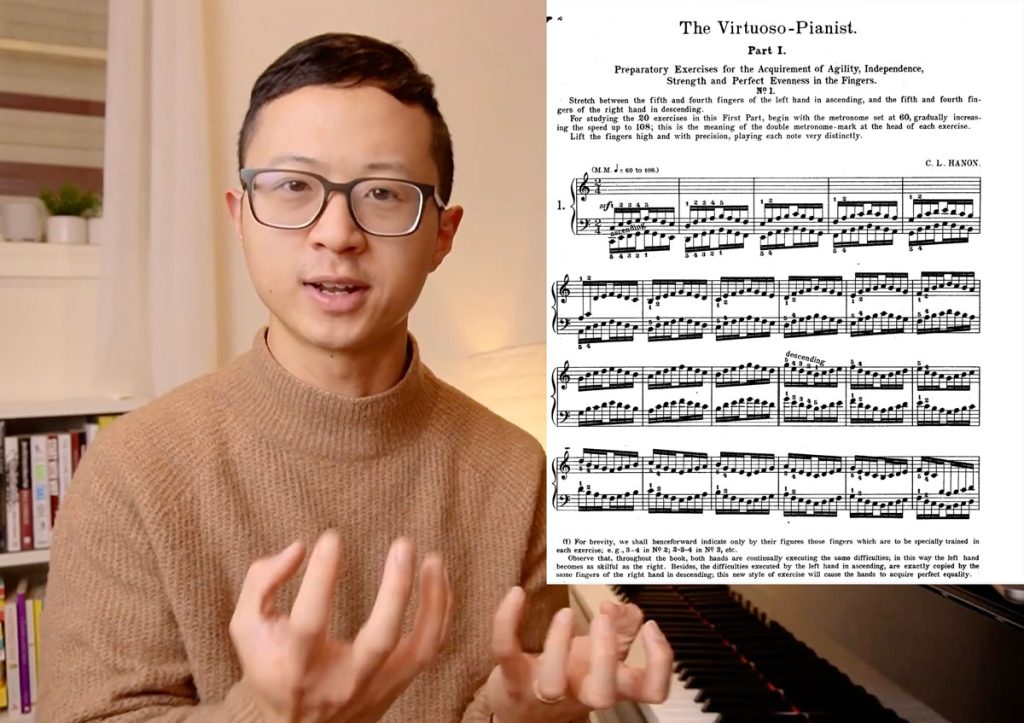
Module 2
Practice Makes Perfect

How much time should I spend practicing vs. playing? How important is music theory and sight reading?
In Module 2, we’ll cover it all and I’ll help you find YOUR perfect practice routine – No matter how busy your schedule is.
Here’s some of what you’ll learn:
- Bad Habit Removal: Get a list of my “22 Bad Habits” I see most often in students – And the mindset shifts and practice routines you’ll need to remove them from your playing for good
- Mastering The Music: One of the most common questions I get asked is “How do I know when a song is done and I’m ready to move on to the next one?” I’ll breakdown the checklist I use with students so you never question yourself again
- Tools of the Trade: Metronomes, Hanon exercises, recording yourself on camera – Get a list of my “tools of the trade” that you can use to break bad habits and speed up your learning curve
- The Perfect Practice Routine: I see way too many self taught players sitting down at the piano without an intentional practice routine for getting better – I’ll show you exactly what to focus on based on your experience and time available
We’ll finish Module 2 by creating YOUR perfect practice routine – Including how best to use this course and apply what you learn in your practice sessions and playing.
Next it’s time to move on to…
LEVEL 1: THE ESSENTIALS
Module 3
Essential Sightreading
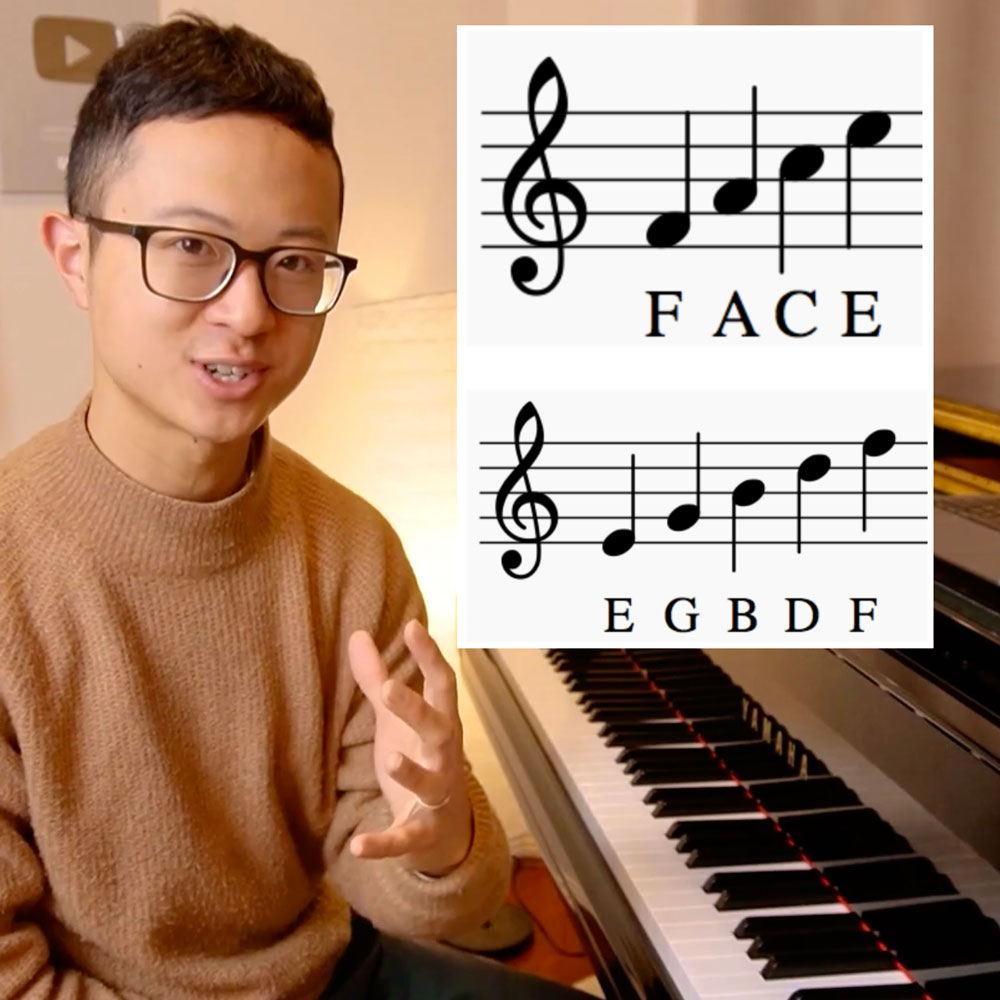
I can’t tell you how much of a gamechanger it is when you’re able to recognize patterns in the sheet music and instantly know how to play them…
And in Module 3, we’ll start building this essential skill by learning how to read and interpret musical notation at the foundational level.
Here’s some of what you’ll learn:
- Simplified Signatures: From simple to odd time signatures, ledger lines and key signatures – I’ll give you dozens of tips and tricks to quickly recognize the right key and pace for ANY passage
- Finger Numbers & Hand Positioning: The numbers are there for a reason! I’ll teach you the best practices for using finger numbers and how to position your hands properly to play challenging passages without the headaches
- Identifying Intervals: The faster you recognize the intervals between each note, the faster you’ll be able to play them – I’ll share the 5 most common intervals and how to etch them in your brain to make your playing automatic
- Rhythm & Dynamics: One of the hallmarks of an amateur player is inconsistent rhythm and dynamics! I’ll show you how to master simple rhythms without forgetting the dynamics and playing the piece exactly how the composer wrote it
- Melodies Made Easy: I’ll also share a simple trick I teach beginners to sight read melodies faster – And how focusing on one hand at a time can actually speed up your learning process
By the end of Module 3, you’ll already have a much better understanding of the notes on the page and notice a tangible difference in how fast it takes to learn new passages.
But we won’t stop there! Because if you really want to understand the “language of music” you’ll need to learn…

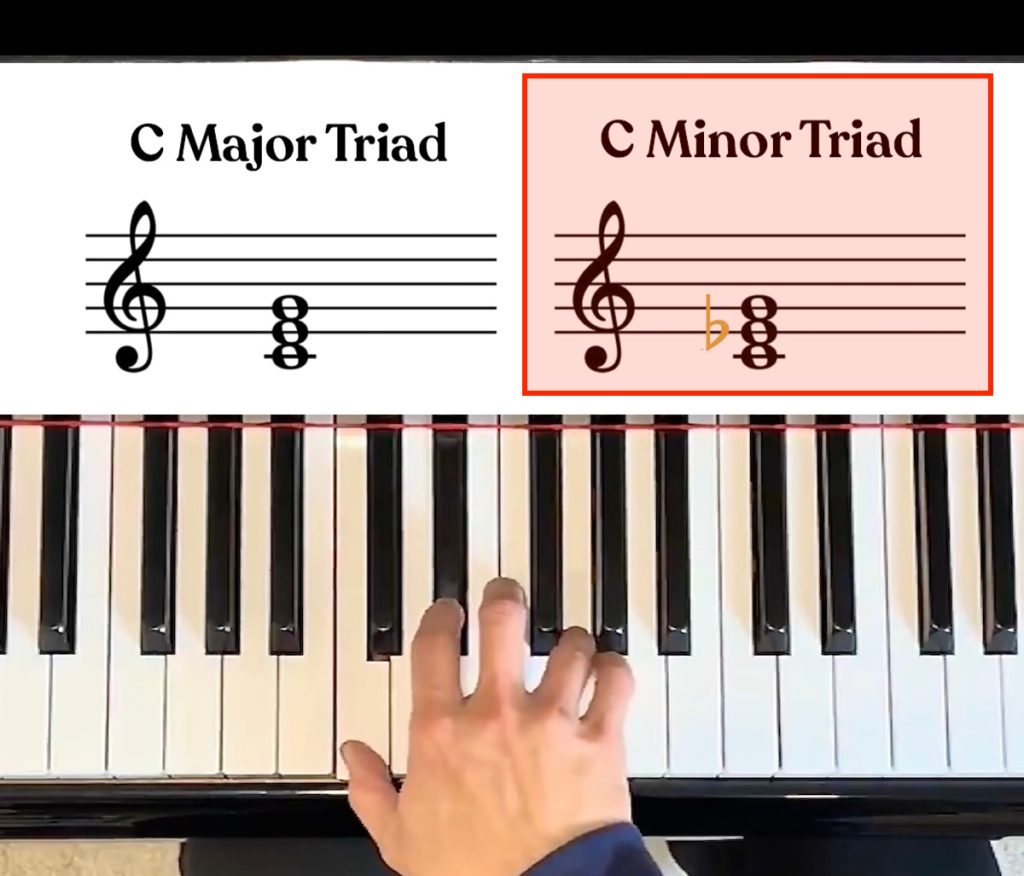
Module 4
Essential Music Theory

Tritone substitutions, diminished 7th chords, mixolydian scales…
It’s no wonder so many musicians are intimidated by music theory! Which is why Module 4 will break things down to the essential foundation.
Here’s some of what you’ll learn:
- Simplified Scales: We’ll start with a quick intro to the most important scales – Where I’ll show you how each “step” in the scale leads to a different quality and tone (And how to train your ears to spot major and minor scales in songs)
- The Basics of Chords: We’ll then take those scales and learn how to create major and minor triads out of them – Plus how to turn those chords into arpeggios and beautiful sounding practice routines!
- Chord Progressions Decoded: We’ll then take those chords and put them together into popular chord progressions – Don’t be surprised if you start hearing these same progressions again and again in the classical pieces you play!
- Instant Articulation: The final polish on any piece is adding the right articulation (Legato, staccato, and pedal notes) – I’ll show you how to read these markings in the sheet music and play the piece more accurately
- Basic Ear Training: You don’t need perfect pitch to easily pick up new melodies and chord progressions that you hear on the radio! I’ll show you how to quickly identify major and minor chords, as well as simple intervals by ear
When you start seeing the connections between the notes on the page and the music theory behind it, it’s as close to a “seeing the matrix” type moment as you’ll ever get.
And by the end of Module 4, you’ll already be recognizing new scales and chord progressions in the pieces you play.
Module 5
Essential Technique

It’s time to get those fingers moving!
Module 5 will focus on the fundamental techniques that all beginner piano players need to develop more control, finger strength and hand coordination in their playing.
Here’s some of what you’ll learn:
- Play With Poise: Bad posture, cramped wrists, ignoring finger numberings – These might not seem like a big deal but they’re actually KILLING your progress! I’ll show you how to play with poise to prepare you for more challenging songs
- Hand Coordination 101: There’s a reason my first course was all about hand coordination! It’s one of the biggest struggles piano players face and I’ll walk you step by step through mastering this necessary skill
- Finger Strength Scales: I’ll also share a few simple, one octave scales you can use to develop finger strength and speed in your playing – With the added benefit of getting you more familiar with the most popular key signatures
- Easy Arpeggios: Now that you understand a bit of music theory, you’ll start to see how often arpeggios are used in your music! I’ll share multiple one octave arpeggio exercises that will speed up your playing in the most common keys
- Pedaling Basics: And finally, we’ll go over the basics of the pedals and how to use them for BOTH legato and staccato passages – I’ll also show you some simple exercises to build your foot-hand coordination
By the end of Module 5, you’ll now have an essential foundation of playing techniques and musical knowledge to master many new challenging pieces.
Which leads us to our first application section…

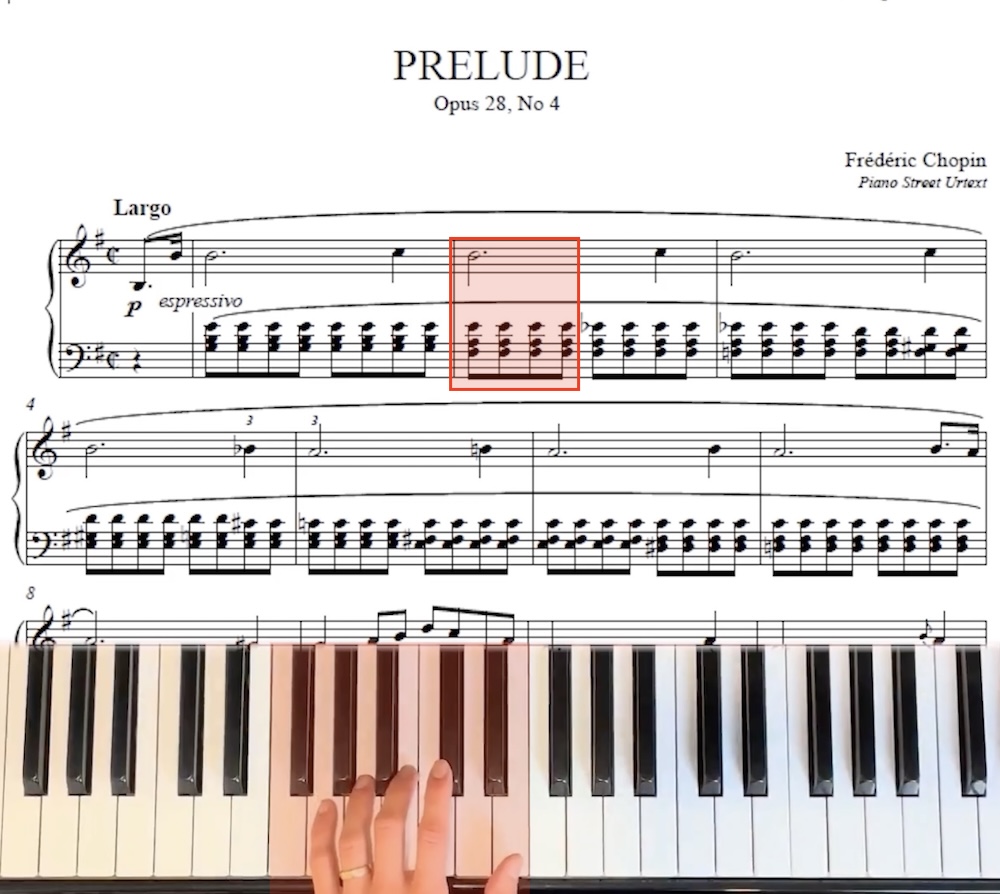
Level 1
Application Section

At the end of each level, I’ve also included an “Application Section” with a playlist of my favorite pieces to play for students at this level.
- For Level 1, this includes pieces like: Chopin - "Prelude in E Minor" (Op. 28, No. 4), Clementi - Sonatina in C major Op. 36 No. 1, Petzold- Minuet in G major, BWV anh. 114, Burgmuller- Arabesque, op. 100 no. 2, Burgmulller- Ballade in C minor, Bach- Little Prelude in C Minor, BWV 999, Bach Prelude in C major, BWV 846, and more!
We’ll finish Module 2 by creating YOUR perfect practice routine – Including how best to use this course and apply what you learn in your practice sessions and playing.
Next it’s time to move on to…
LEVEL 2: INTERMEDIATE
Module 6
Intermediate Sightreading
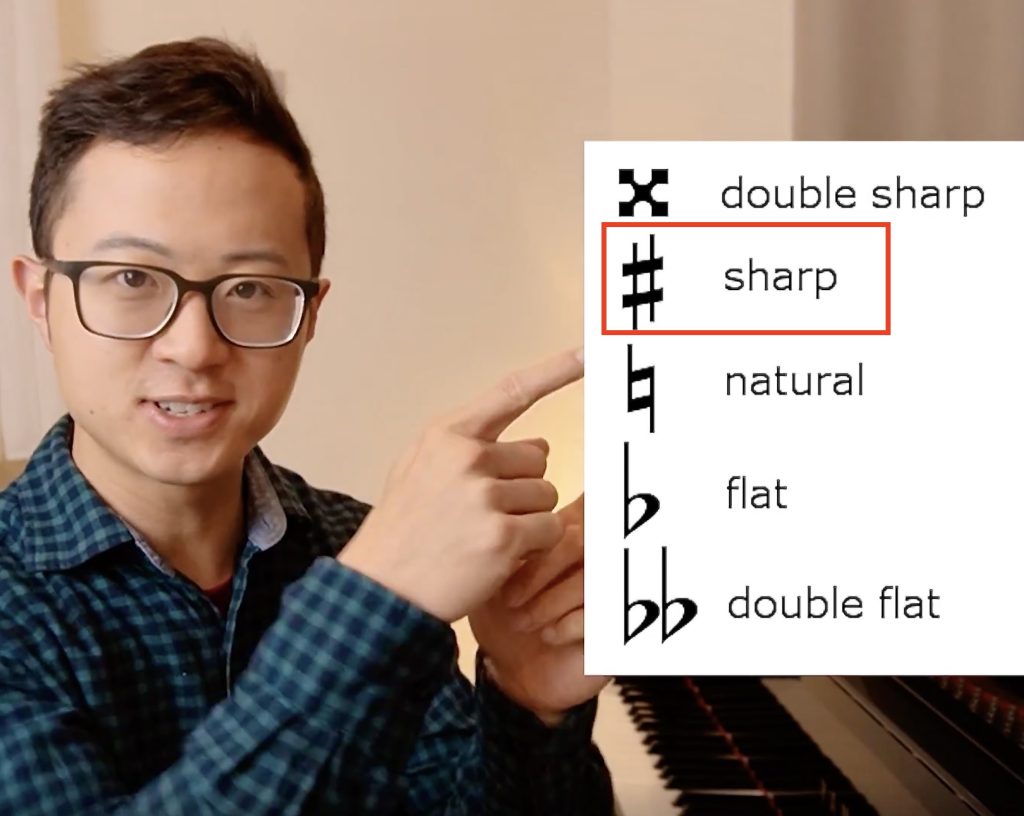
Now that we’ve got a good grasp of the basics…
It’s time to start learning more challenging musical notation and key signatures that you’re likely to encounter at the intermediate level.
Here’s some of what you’ll learn:
- Sightreading Shortcuts: From how you approach a new piece, to simplifying complex passages – I’ll share 8 sightreading “Best Practices” that will help you get up to speed on challenging songs faster and get your hands working together
- Expanded Key Signatures: The more key signatures you’re comfortable with, the more confidence you’ll have in playing an expanded range of songs – I’ll share the secrets to playing pieces with up to 4 sharps and flats with ease
- Complicated Rhythms: Don’t be intimidated by syncopation, odd time signatures, or dotted rhythms – I’ll show you how to master these unique rhythm notations and “hear them in your head” when you see them in your sheet music
- Accidentals And Modulation: Another common way players get tripped up is when a piece changes keys – I’ll show you how to distinguish between an accidental and key modulations so you’re ready when they pop up in your pieces
- Easy Ornamentation: As you start playing more challenging pieces, you’re going to come across all these weird little symbols like grace notes, trills and mordents – I’ll explain what these are and how to play them
We’ll finish Module 6 with a few longer length sightreading exercises to reinforce what you just learned – Using pieces with a variety of dynamics, articulation and rhythm.
And then, just like in Level 1, we’ll continue building our musical knowledge in…

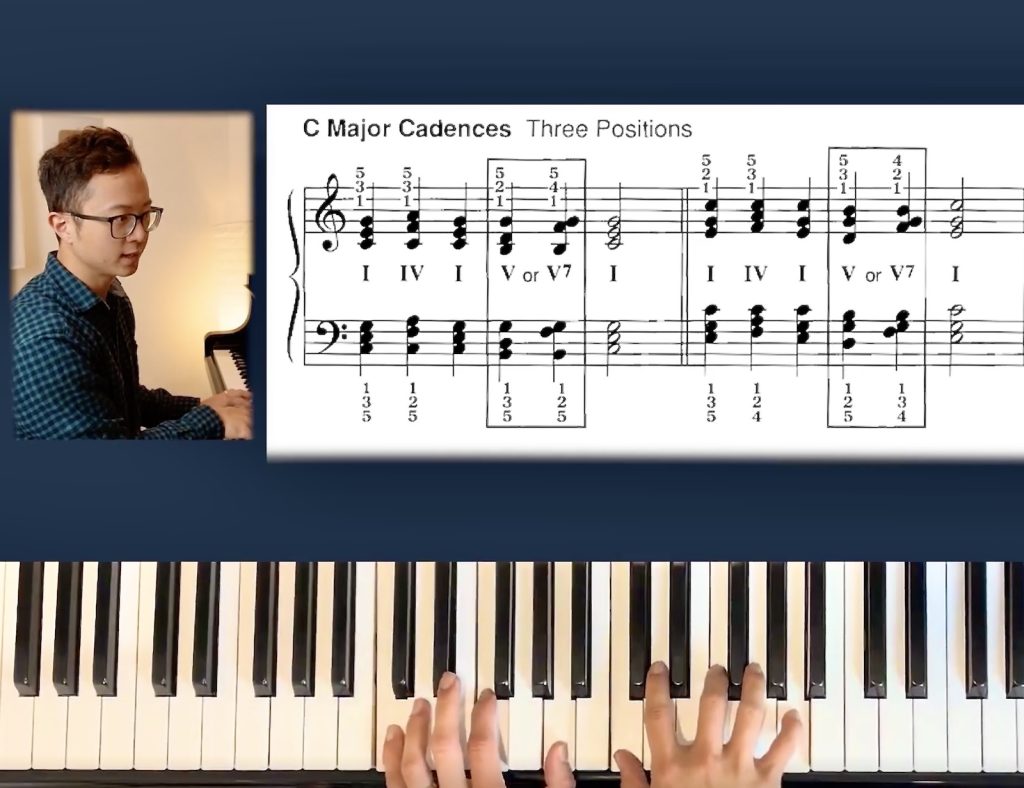
Module 7
Intermediate Music Theory

If you want to expand your musical “color pallet” beyond just simple major and minor scales, you’ll need to learn more complex chords structures and progressions.
So that’s exactly what we’ll do in Module 7! Here’s some of what you’ll learn:
- Arrangements Made Easy: The better you understand the structure of how songs are put together, the easier it is to predict what comes next! – I’ll show you how phrasing and cadences create musical sentences in the sheet music
- Harmonic and Melodic Minor Scales: Ever wonder why some songs sound more “ethnic” or interesting? I’ll show you how these flavorful scales are used in both classical and jazz music and teach you the fingerings to play them smoothly
- Chord Inversions Explained: Inverting chords and proper voice leading can be a challenge for a lot of players – I’ll show you a simple trick to quickly invert any chord and use them in your piano accompaniment
- Complicated Chords: We’ll also learn about dominant, major, and minor seventh chords and how to play more complex arpeggios with both hands
- Pop Chord Progressions: And finally, we’ll explore the most common chord progressions you’re likely to hear in pop music – And I’ll show you how learning ONE simple chord progression can help you play dozens of popular songs
By the end of Module 7, you’ll now have the skills to quickly interpret more complex musical scores, and your playing will feel less about “learning the notes” and more about “making music.”
Now it’s time to take that musical knowledge and apply it to your playing!
Module 8
Intermediate Technique
In Module 8, we’ll cover more advanced playing techniques like larger intervals, longer scales, and playing challenging arpeggios smoothly…
We’ll also talk about how to focus less on the playing and more on adding expressiveness, control and dynamic range to the music as you move towards the mastery level.
Here’s some of what you’ll learn:
- Increased Intervals: The larger the jump between notes, the harder it is to play them! I’ll share multiple finger substitution and thumb under exercises to get you playing challenging intervals smoothly
- Extended Arpeggios: When you start playing multi-octave arpeggios, learning the proper finger crossings is key – I’ll show you how to play each arpeggio in the most common keys with more speed and accuracy
- Expand Dynamic Range: It’s not easy controlling crescendos and diminuendos when they’re different in each hand! I’ll show you how to practice each hand independently and create a balanced, multi-layered texture to your playing
- Left-Hand Dexterity and Flexibility: Don’t leave your left hand behind! I’ll help you continue building your left-hand agility – So you can effortlessly play more complex bass lines and intricate patterns that appear in more challenging pieces
- Adding Expression: And finally, I’ll show you how to incorporate phrasing, rubato, and other expressive techniques like trills, turns, and mordents to enhance the musical detail in your playing and help you create your own style
By the end of Module 8, you’ll have dozens of new tools and techniques to play the piano with a much wider range of dynamics and expressiveness.
And be building your ability, confidence, and momentum to play even more rewarding and challenging pieces in…
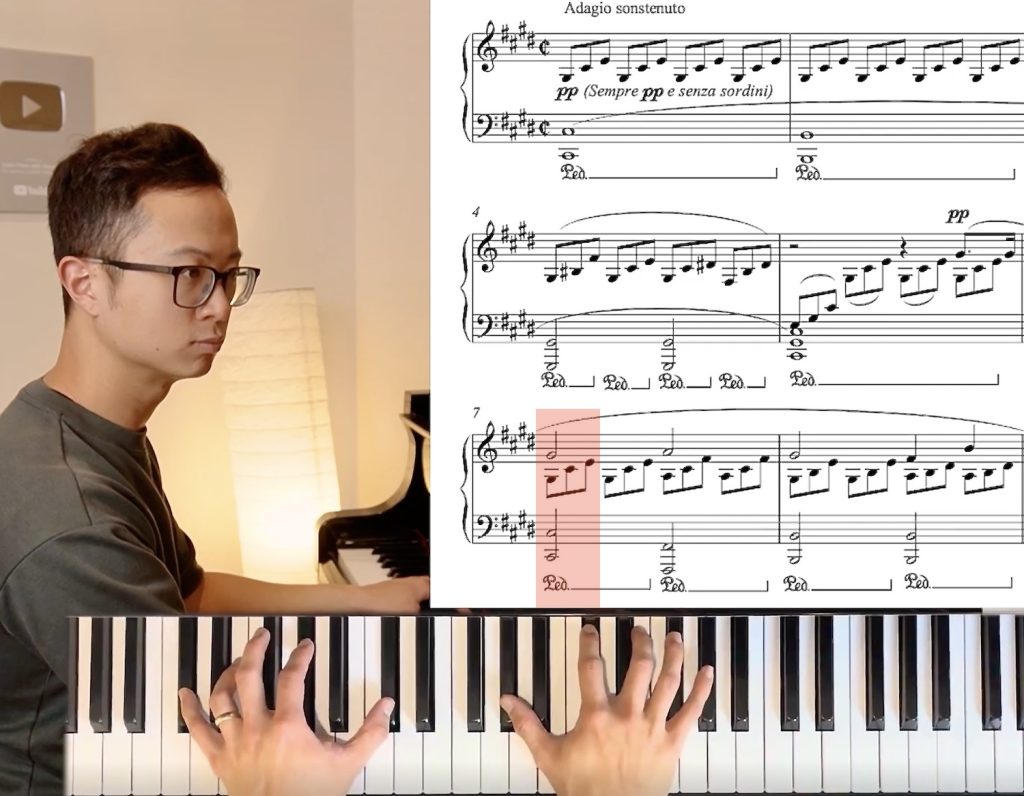
Level 2
Application Section

Just like in Level 1, we’ll finish the Intermediate Level with a playlist of pieces that will refine your playing style and help you develop greater independence between each hand.
- For Level 2, this includes pieces like: Satie- Gymnopedie No. 1, Beethoven - "Für Elise", Beethoven - "Moonlight Sonata, Op. 27, No. 2 (1st movement)", Yann Tiersen- Comptine d'un autre été - L'après-midi, Paul Harvey- Rumba Toccata, Joe Hisaishi- One Summer’s Day, Einaudi- Nuvole Bianche, Sakamoto- Merry Christmas Mr Lawrence, Yiruma- River Flows in You, Chopin- Waltz in A minor, B. 150, and more!
Each piece includes a video breakdown where I walk you through challenging passages, a normal playing version, and a final debrief on how to apply the lessons you learned in Level 2.
Many students have seen a huge ROI from the time they spent learning these pieces and how much they enjoyed playing them, and I can’t wait to have you add a few of them to your musical repertoire!
LEVEL 3: MASTERY
Module 9
Mastering Sightreading
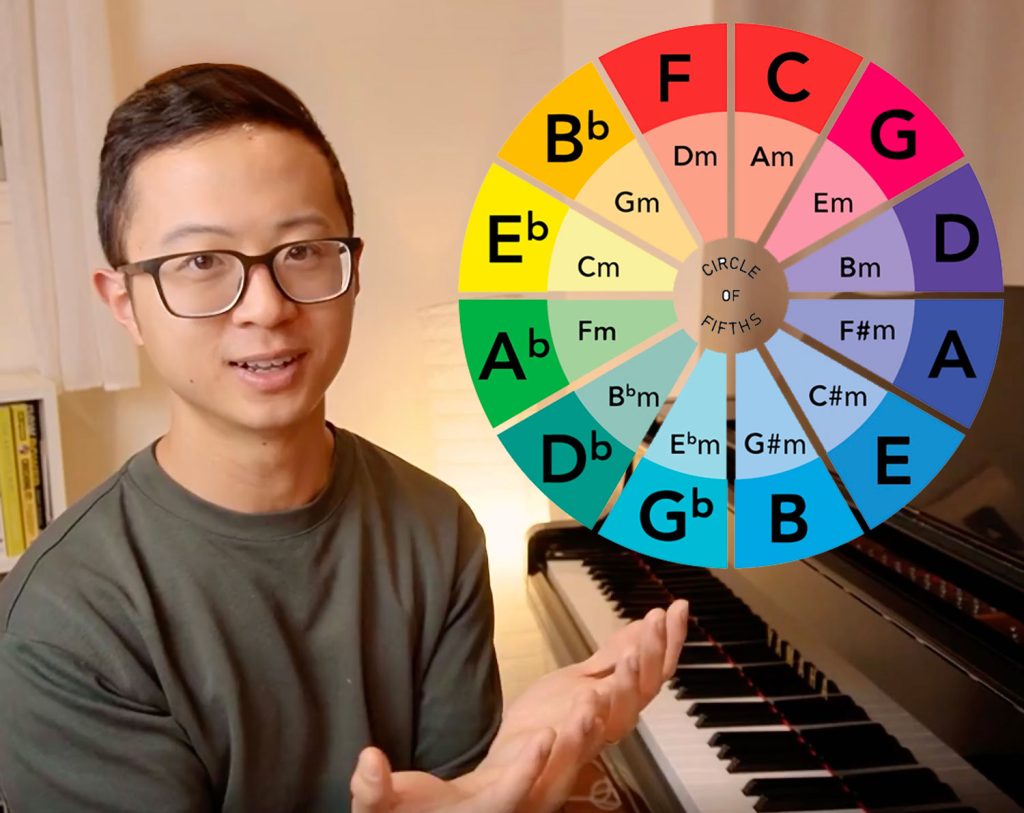
You’ve reached the Mastery Level! In Module 9 we’ll focus on more challenging key signatures, hand coordination passages, and syncopated rhythms you’re likely to encounter in the most complex classical pieces.
Here’s some of what you’ll learn:
- Advanced Keys Signatures: The more sharps and flats you add, the more likely it is to slow you down – I’ll show you how to play these challenging key signatures without the stress
- Complex Rhythms and Meters: Syncopation, polyrhythms, irregular time signatures, and more! I’ll show you how to play more advanced rhythm patterns as well as sightreading multiple independent lines like Bach preludes
- Advanced Dynamics And Articulation: Learn how to apply subtle dynamic changes, articulation variations, and expressive markings to your playing so you can create maximum clarity and emotional impact in your music
- Mastering Left Hand Patterns: From simple chords, to 4 chord progressions, to full on jumping around the piano with your lefthand – We’ll go on a progressive left-hand journey to get you confidently sightreading faster with both hands
- Advanced Sightreading Repertoire: We’ll finish Module 9 with an advanced sightreading exercise that incorporates longer, more advanced passages with a combination of all the elements we’ve learned throughout the course
By the end of Module 9, you’ll now have the sightreading skills to pick up ANY new piece of music and know exactly how it’s supposed to be played…
With a deep understanding of musical notation that covers nearly 99% of all written music.

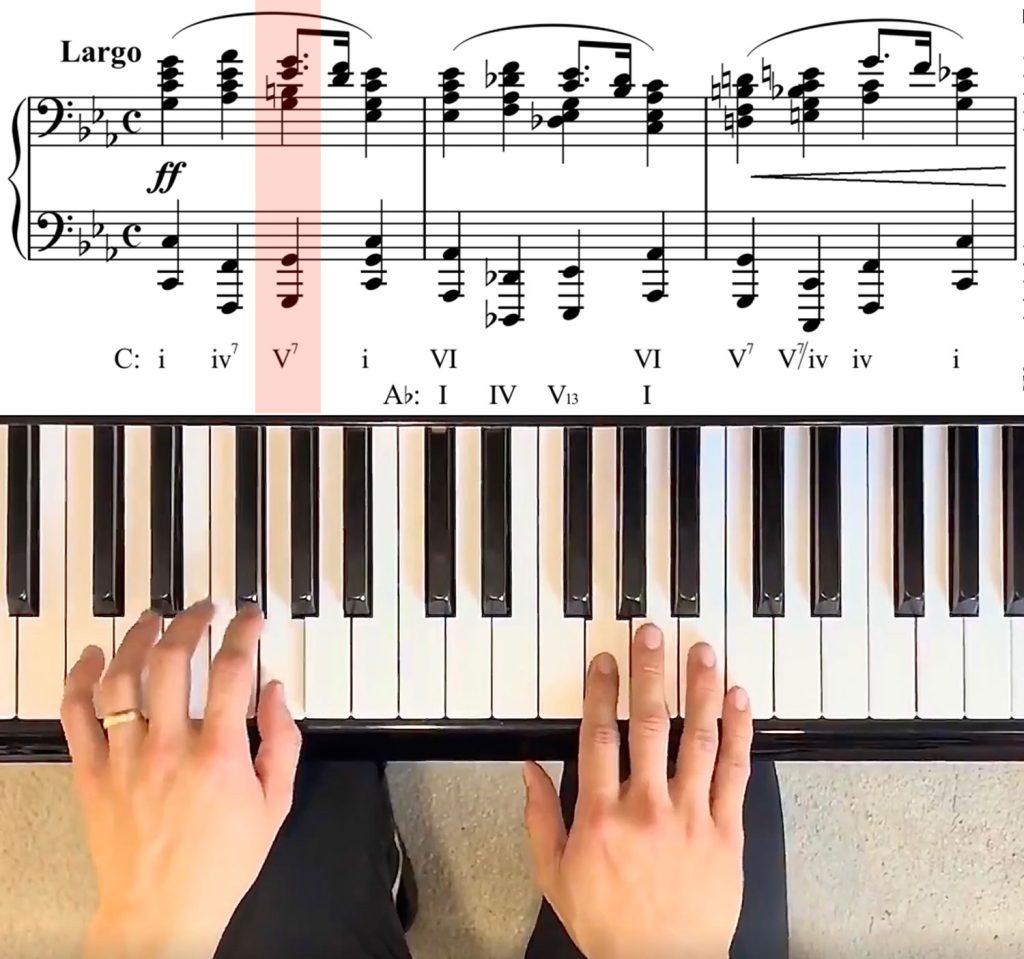
Module 10
Mastering Music Theory

But we won’t stop there! In Module 10, we’ll go even further down the music theory rabbit hole…
Diving into more advanced musical concepts, obscure scales, and complex chord structures.
Here’s some of what you’ll learn:
- Advanced Scale Theory: It’s time to get weird lol! I’ll teach you the whole tone, diminished, and chromatic scales – And how to use them when improvising and composing music to give your music a more unique sound
- Complex Chord Progressions: We’ll also explore more complex chord voicings, like ninths, elevenths, and thirteenths – How they sound, how to play them, and their practical application in chord progressions with extended chords
- Advanced Form and Structure in Music: Learn how to analyze larger forms of classical music like sonata-allegro and rondo – And how to recognize various themes and variations in these complex musical structures
- Polyrhythms and Odd Meters: I’ll also show you how to play more obscure polyrhythms and odd time signatures that trip up many advanced students – And share some hand coordination exercises to get these rhythms right in both hands
- Advanced Improvisation: And finally, I’ll show you how to add extra flavor to your improvisations – Using advanced harmonic and melodic structures to create unique and complex textures that will set your playing apart from other players
By the end of Module 10, you’ll truly have a mastery level understanding of music theory…
Seeing connections everywhere between the notes on the page, chord structures, and understanding why the composer made various decisions in their music.
Module 11
Mastering Technique
Then in the final module, we’ll cover some advanced virtuoso playing techniques…
Giving you a level of proficiency to play nearly any challenging passage you come across – Even when tackling the most difficult classical pieces.
Here’s some of what you’ll learn:
- Advanced Scales And Arpeggios: I’ll show you how to practice four-octave scales and arpeggios in all the major and minor keys – Focusing on speed and consistency with an emphasis on evenness and fluidity
- Mastering Octaves and Larger Intervals: We’ll then crank up the difficulty by learning how to play even larger intervals and octaves – And I’ll show you the proper technique and hand positioning to play them accurately and smoothly
- Double Notes: I’ll also show you how to quickly master repetitive notes, focusing on finger strength and coordination – And walk you through a Chopin etude that will refine your staccato playing with a focus on finger, wrist, and arm techniques
- Conquering Crossed-Hands: Learn how to practice cross-hand techniques using advanced classical pieces – And develop smoother transitions and accuracy in your playing even if both hands are playing complicated parts
- Chopin Advanced Etudes: And finally, we’ll go through a few more advanced Chopin Etudes – Helping you develop speed, fluidity and finger independence while also adding these challenging famous etudes to your repertoire!
By the end of Module 11, you’ll now have the technique, hand coordination, and dexterity to tackle ANY challenging passage…
And have a freight train level of confidence, experience, and momentum to start playing virtuoso level classical pieces.
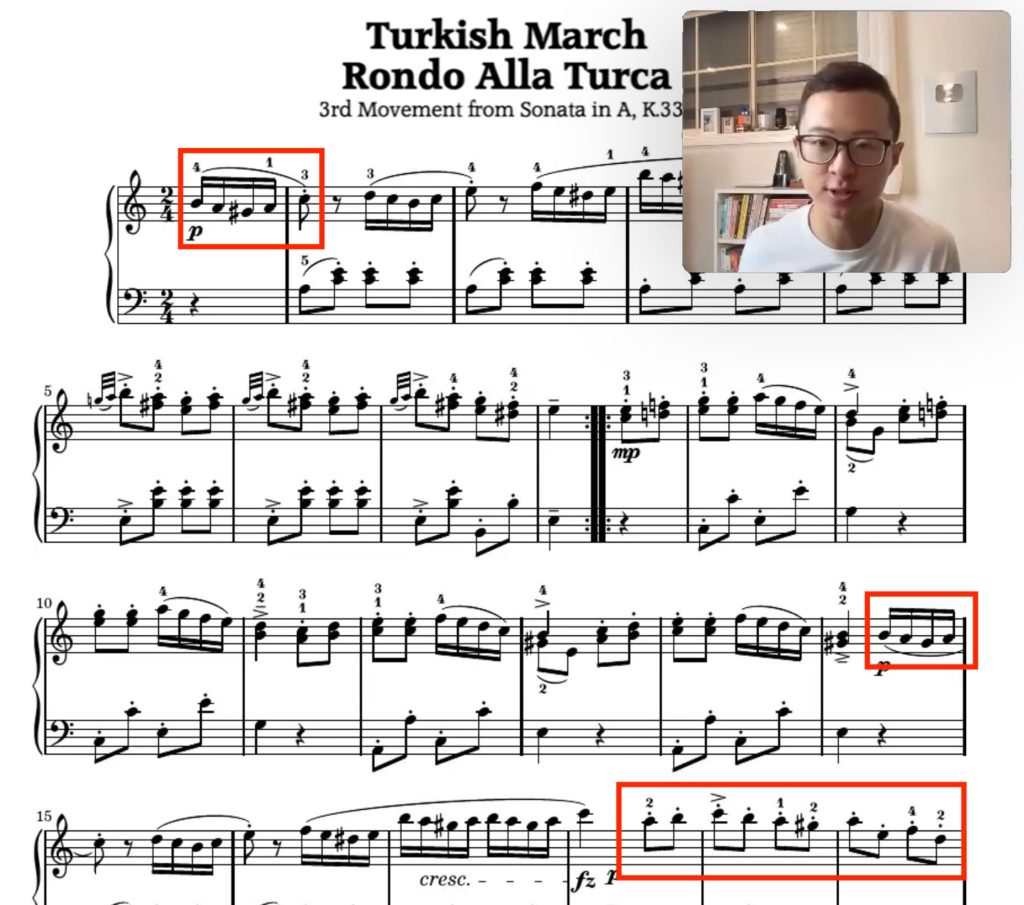
Level 3
Application Section

Congratulations! You’ve made it to the final Application Section!
In this level we’ll apply all the technical skills, nuanced interpretation of music, and deep understanding of musical expression we’ve developed throughout the course…
And use these advanced skills to tackle some of the most challenging classical pieces out there.
- For Level 3, this includes pieces like: Pieczonka- Tarantella, Mozart- Rondo Alla Turca in A Minor (Turkish March), Debussy- Clair De Lune, Chopin- Nocturne in C sharp minor, Op. Posth, Chopin Waltz in C sharp minor, Chopin Op. 64, No. 2, Chopin- Nocturne in E flat major, Op. 9 No. 2, Bach Invention in F major, Alan Silvestri- Forrest Gump, Beethoven Pathetique Mvt 2., Bach Prelude and Fugue in C minor, BWV 847
As always, each piece includes a video breakdown of challenging passages, a normal playing version, and a final debrief.
There is always more to explore in the world of piano, but by the time you finish Level 3, you’ll truly have everything you need to play ANY piece of music you come across…
And have added many new beautiful, enjoyable and challenging classical pieces to your repertoire in the process!
LIMITED TIME OFFER
Get These Special Bonuses FREE When You Join Today!
BONUS 1
Scales And Arpeggios Masterclass ($197 Value)
The first bonus you’ll get is my Scales and Arpeggios Masterclass.
In this comprehensive training, you’ll learn how to confidently play every major, minor and chromatic scale, along with their corresponding arpeggios in root position and inversions.
Covering all 12 keys, this resource is designed to strengthen your technique, enhance your musical understanding, and prepare you for tackling any new classical piece with ease.
I could easily sell this as a stand-alone course, but when you join Keys to Mastery today, you’ll get the entire video training included with your purchase for free.
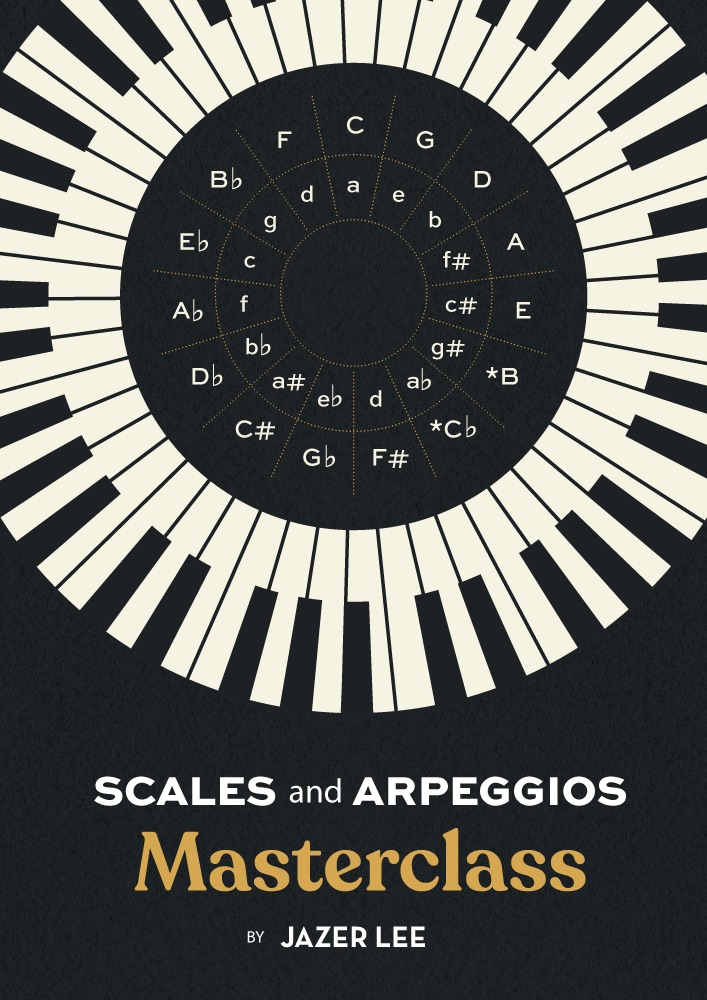

BONUS 2
The Essential Piano Roadmap ($97 Value)
If you’ve ever asked yourself “What piece should I play next?” then you need my Essential Piano Roadmap!
With brand new additions to the original playlist, this bonus includes a list of every classical piece we’ll cover in the course ranked from beginner to advanced.
And gives you a quick-scan guide of pieces to play, with links to sheet music and video performances…
So you always have multiple options for pieces to play as you build your skills and confidence.
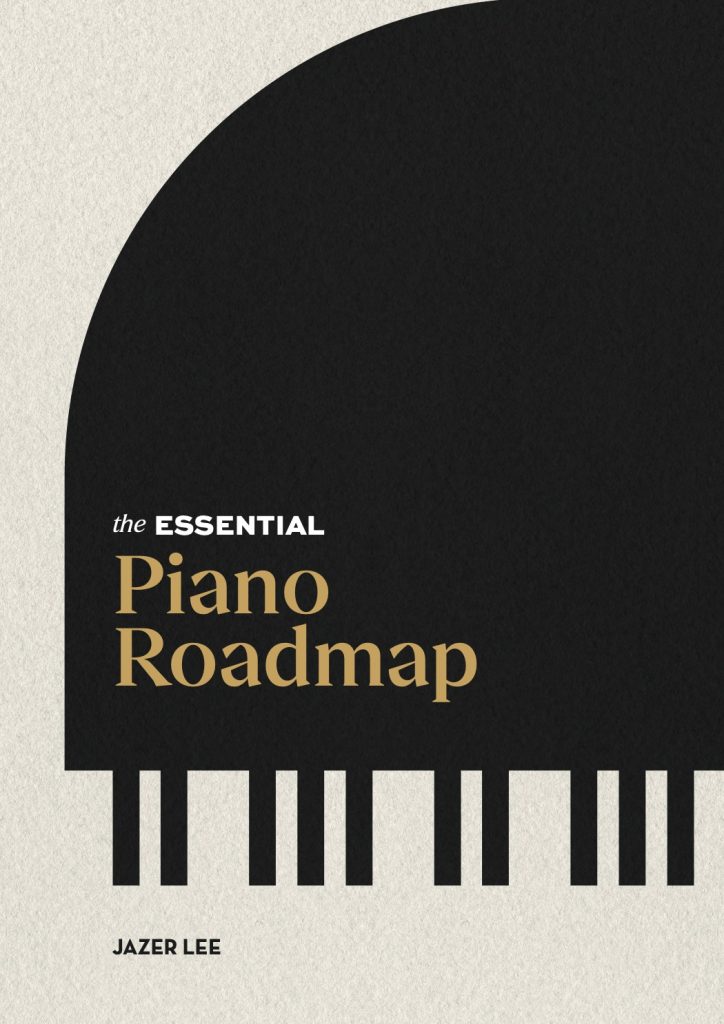

BONUS 3
Monthly Coaching Calls Hosted By Me ($450 Value)
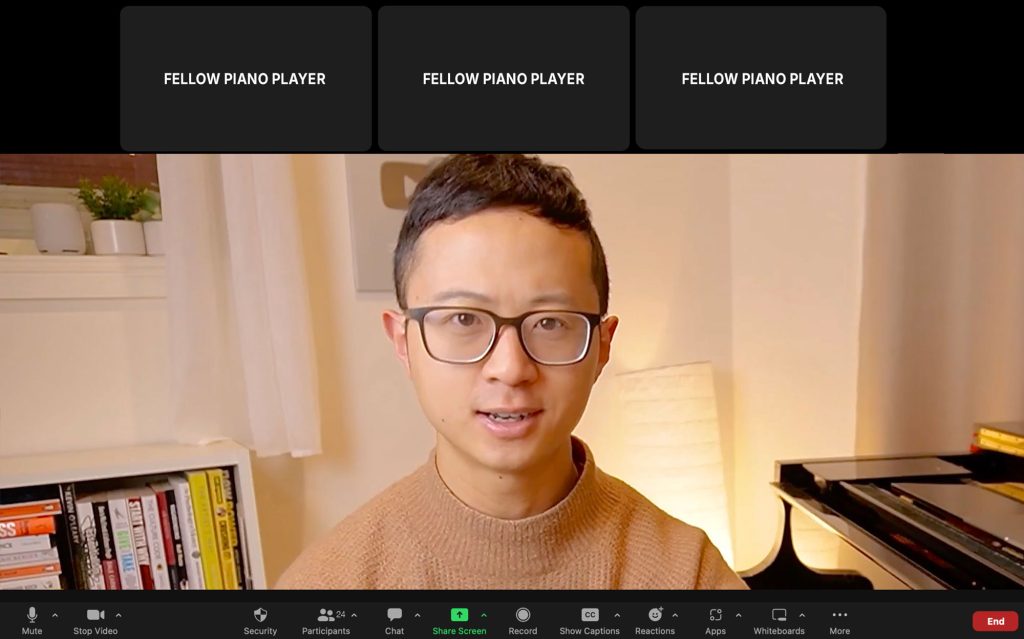
And finally, when you join Keys to Mastery today, you’ll also gain access to the monthly LIVE Group Coaching Calls!
Here’s your chance to ask me anything as you go through the course materials…

And then each month, for the next 3 months, you’ll have the opportunity to join a LIVE group coaching call with me and your fellow piano players.
Normally if you wanted to get this level of feedback from me, it would require an intense screening process and cost you $150 a session.
But when you join Keys to Mastery today, you’ll gain access to all 3 of these exclusive calls for free!
30 Day Money-Back "Favorite Piece" Guarantee
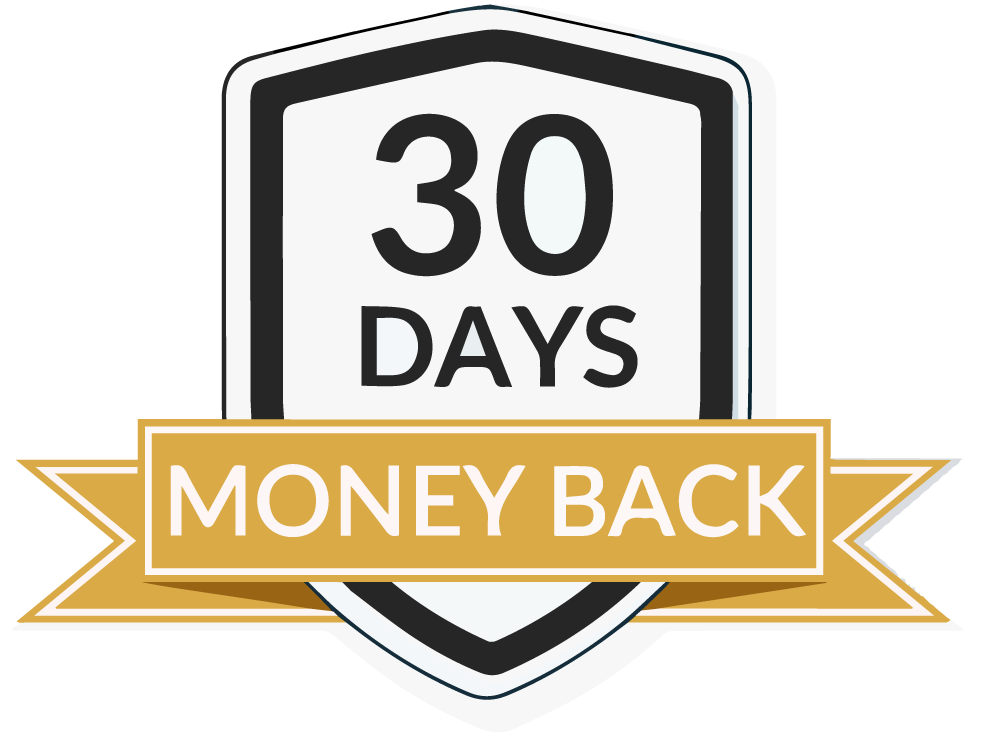
On top that, I believe in this course so much, I’m also including a no questions asked 30 Day Money-Back “Favorite Piece” guarantee.
This gives you full month to try out the course, apply what you learn…
And if you don’t see an immediate impact in your playing, if you don’t have a new-found confidence and excitement to jump into more challenging songs…
If you’re not able to easily play AT LEAST one new piece you’ve always wanted to play in the next 30 days, just shoot my team a message asking for a refund and I’ll send you 100% of your money back!
Just make an honest attempt at applying what you learn in this course, and I will literally guarantee you level up your playing and start playing more challenging songs!
Let's Recap Everything You Get

- Keys to Mastery Program – Lifetime Access ($997 Value)
- Bonus #1 – Scales And Arpeggios Masterclass ($197 Value)
- Bonus #2 – The Essential Piano Roadmap ($97 Value)
- Bonus #3 – Recorded Group Coaching Calls ($450 Value)
TOTAL VALUE: $1,741
You Get It All Today For:
$
597
(Or 3 Payments of $229)
All prices listed in USD

Stop Wasting Your Time Without A Gameplan And Start Learning The Keys To Piano Mastery
I see way too many self taught piano players going it alone…
Constantly questioning themselves and wondering if they’re playing the right thing.
Now you have a roadmap, with me as your guide, holding your hand every step of the way!
With over 18 hours of cutting edge content inside this course, you’re getting nearly 4 years of piano training in one program.
For Less Than The Cost Of Three Private Sessions

But instead of spending tens of thousands of dollars at university becoming a classically trained pianist…

Or even a years worth of private lessons with me, which at $150/hour would be nearly $7,500.
You get all of this knowledge PLUS access to me LIVE in the group calls for less than a month of one-on-one sessions. (That’s a 95% Discount!)
After nearly 3 decades of playing the piano, I can confidently say there are few things in life as enjoyable and rewarding as…
- Sitting down at the piano and just forgetting about everything
- Effortlessly playing your favorite piece
- Gliding through tough passages that would trip up 99% of players
- And connecting emotionally with the music and conveying that connection through your playing
Piano is the one place you can feel safe. It’s beautiful. Yet you also work your brain (And can show off a bit if you want to!)
Now it’s your turn to take your playing to the highest level!
I’d love to be your guide along the way.
It all starts by clicking the “Enroll Now” button below, and I’ll see you on the inside!

Jazer Lee
Creator of Jazer Lee Piano
GOT QUESTIONS?
Frequently Asked Questions
This course is designed to be a comprehensive, step by step course, where each level builds off of the last one and includes exercises and action items you need to complete before moving on…
This isn’t just some data dump of information, instead you’ll be applying what you learn each step of the way which will immediately impact your playing.
And even if you tried to find similar information online, you’d have to sift through years of blog posts and videos that can easily lead to overwhelm or wasted time because it’s not organized into a step by step process – And wouldn’t include any of the exercises or action items.
This is my first course that covers every aspect of piano playing. The Hand coordination bootcamp is kind of launching pad for the complete beginner.
But Keys to Mastery was built for the self taught player who wants to take their piano playing to the highest level. It’s roughly aimed at replacing an in person piano teacher without spending $150/week for years to get access to the same type of guidance.
Keys to Mastery is for ANYONE who wants to take their piano playing to the next level and expand their repertoire with more challenging classical music.
If you’re just starting out, this course will give you an essential foundation of playing techniques and musical knowledge to learn new songs faster and start playing more challenging classical music.
If you’ve reached the intermediate level, this course will help you break through your plateau so you can play challenging popular classical pieces like Claire de Lune and Chopin, the pieces you’ve always wanted to play but struggled with in the past.
And even if you’re an advanced player, this course will help fill in the gaps, uncover your blindspots, and give you those 1% improvements so you can play the most challenging classical pieces ever created and play the piano at the highest level.
After purchasing you will receive an email that includes login details and a link to sign into a private members area that houses all the videos.
There you will also find the schedule for all the LIVE group coaching calls, and be able to directly join the call and access the past recordings inside your members area.
Keys to Mastery is a self-paced online course, so you can go through the lessons at any time that is convenient for you, and because you get lifetime access when you join, you don’t need to worry about your schedule getting busy.
Yes! I’ve included a full members area with an activity feed and messaging platform so you can interact with your fellow players, ask questions, and celebrate wins together! :)
Once enrolled, you will have lifetime access to the Keys to Mastery videos.
I’ve created a custom learning platform on our own server so that you’ll never lose access to the training videos and bonus content. (As well as any future materials I may add to the course down the road)
Yes, there are payment plans available. After clicking the big “Enroll Now” button, you’ll be redirected to a checkout page where you can choose between paying in full for $597 or 3 monthly payments of $229.
The honest answer is: It depends!
There are a lot of factors that go into how long it takes to develop the skills and understanding needed to play the most challenging classical songs.
I’ve put everything I could into this course and view it as a complete 4 year classical piano curriculum.
But you should start to see tangible results within the first month or two if you’re following the program, going through the lessons, and applying what you learn in the application pieces at the end of each level.
Yes! That’s why I created my 30 Day Money Back “Favorite Piece” Guarantee.
Here’s how it works: Join the course, and if you don’t see an immediate impact in your playing and are able to play at least one of your “favorite” classical pieces that you’ve always wanted to play by the end of this course, you can get your money back!
Just shoot my team a message and we’ll send you a prompt and courteous refund.
CHECK OUT WHAT STUDENTS ARE SAYING
RATINGS & REVIEWS
Ratings and Reviews

As an intermediate pianist, I'm not sure what I was expecting. All I knew was that after years at this level, my deficiencies had not improved and were holding me back. Not knowing how to correct this, I watched countless YouTube videos and invested in a couple of other programs to no avail. I am halfway through keys to mastery, and my improvements are tangible! I'm finally confident at piano!
I followed 5 different courses during black Friday and chose Jazers course for several reasons, one of the most important being that it was not a monthly subscription course. My journey learning piano has been long and arduous and I can't imagine paying monthly with the slow progress I[ve made.
Jazzer is an excellent teacher, and moves at a good pace. However as I progressed up level I had expected there to be a more comprehensive continuation of what I will call " Jazzer guided teaching or review" of each of the pieces in each section. I found his Mastery program to provide a more consistent focus on mastering each level than what I have found with other similar courses.
I had a bit more than one year piano lessons about 20 years ago. I picked it up this time by following Jazer's Key to Mastery courses. I am self learning on my own pace. I find that I am making progress! I am in the intermediate level now. I find it is not enough to just complete your courses and songs. It would be very helpful if you could provide additional list of popular songs to study.
Copyright © 2025 – Jazer Lee Piano – Made in partnership with Alters House Publishing

This course has been a great experience. I am 60 and have not played in 40 years, but I played in my youth for 15. I was super rusty at the start of this course , then within a few weeks of having followed clear instructions on all the module lessons I couldn’t stop practicing! I highly recommend if you’re picking up the piano again!! Janine Greff